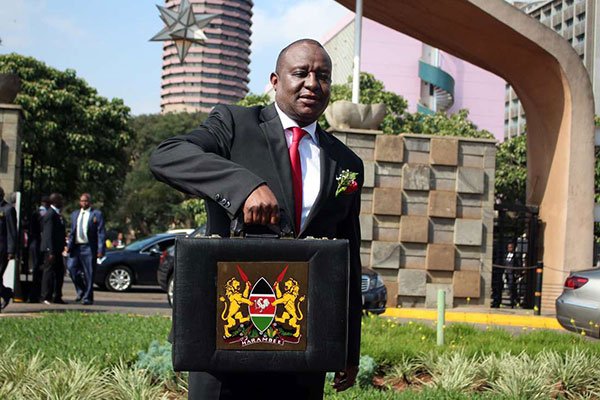
The 2019/2022 financial budget has been described as a shocker by Kenyans with the majority pointing fingers to the high level of borrowing from international countries.
The budget estimate of 2019/2020 that has totaled to Ksh3 trillion will leave Kenyans anxious once it has been presented. This is because the deficit balance in the financial evaluation will hit Kenyans hard.
Kenya’s debt had by September last year risen to Ksh5.2 trillion, Ksh2.5 trillion of which was owed to domestic lenders. The National Treasury is targeting to raise Ksh607.8 billion to plug a budget deficit in the Ksh3.02 trillion 2019/20 financial year budget.
Kakamega residents want CS Rotich to lower price of Unga in the Budget. #BudgetKe2019 pic.twitter.com/tUtexQXd5i
— Daily Nation (@dailynation) June 13, 2019
The Cabinet Secretary is expected to reveal how the country will finance a record Ksh3 trillion budget, the biggest in Kenya’s history.
Recently the CS Rotich defended the budget the economy has, for instance, grown by an average of 5.6 percent per year for the last five years, outperforming the average growth rates of previous five years from 2008 to 2012.
The deficit numbers are even worse than they look coz they do not include the PENDING BILLS. GoK budgets for a road, completes 25% of the road & the 75 % to complete that road is not budgeted for in the next FY. Why so many projects are incomplete. #BudgetKe2019
— Mohamed Wehliye (@WehliyeMohamed) June 13, 2019
Will the Kenya Revenue Authority impose more tax on Kenyans? As it is, KRA is required to contribute Ksh1.9 trillion towards the financial budget, but the question Kenyans seem to ask is what or where the deficit will be directed to.
One scenario to finance the budget could see Treasury Cabinet Secretary Henry Rotich push it to Kenyans with the introduction of new taxes. This could be through raising Value Added Tax (VAT) from the current 16 percent – the lowest among the East African Community nations. Other likely targets are the betting industry and capital gains tax, which targets the wealthy.
Kikuyu MP Kimani Ichungwa: We must always temper our expectations with the reality on our revenue projections. #BudgetKe2019 #Big4Budget pic.twitter.com/eQk4RPmTQ5
— K24 TV (@K24Tv) June 13, 2019
President Uhuru Kenyatta’s Big four agenda is expected to spend Ksh450.2 billion, being 14.6 percent of the total budget.
Development spending on items like road upgrades, dam building, and power transmission will consume Ksh701 billion, almost equal the Ksh696.5 billion that will be used to repay debt in the upcoming financial year.
Kenya budget on June 13th. #BudgetKe2019 Important for economic stability & the 16m Kenyans living in poverty.
Analysts looking for:
• Fiscal sustainability: downward borrowing & realistic revenue.
• Focus on development spend & impact.
• Commitment to timely expenditure. pic.twitter.com/FbjVmFOPu7— Julius Court (@JuliusCourt) June 11, 2019
The government will receive Ksh1.841 trillion while the Consolidated Fund Services (CFS) — which is used to pay debt and salaries will eat Ksh805.8 billion, as counties get Ksh371.6 billion.
Universal Health Coverage (UHC) is expected to consume Ksh47.8 billion as managed equipment services gets Ksh6.2 billion. Affordable housing will get Ksh11.4 billion, with Ksh5 billion allocated to the National Housing Development Fund.

Senators and MPs have failed to come to an agreement on the division of revenue bill that touches on the allocation of funds to counties. This happened a few hours to the reading of the national budget by CS Rotich.
The senators had proposed a total of Ksh327 billion county allocations in the 2019/2020 budget, but the Budget and Appropriations Committee of the National Assembly was advocating for Ksh316 billion.
The two houses have been at loggerheads over the past few weeks over the Ksh9 billion difference.
CS Henry Rotich has further set an extremely ambitious revenue target of Sh 2.2 trillion while KRA is expected to collect approximately Sh1.9 trillion #BudgetKE2019 pic.twitter.com/98nEP3xCZt
— The Standard Digital (@StandardKenya) June 13, 2019
Majority Leader of the National Assembly, Aden Duale, spoke on the stalemate and stated that the budget reading would still proceed as planned.
“The CS (Rotich) will still read the budget and he will give an overdraft to the counties to run their activities until the two houses meet to discuss the division of revenue bill. There is no crisis,” Duale affirmed.
Meanwhile, lobby groups including KHRC, TI and AFRICOG have moved to court wanting Rotich stopped from tabling the Budget, until the Division of Revenue Bill is passed.
Amid all that, we wait to see the CS’s move and Kenyans reactions to #BudgetKE2019.
What is your take on this budget? Comment in the comments section.